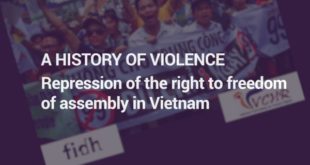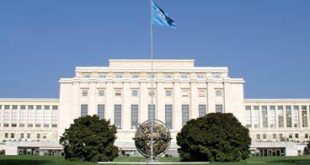by the
Fifth Supreme Patriarch of the
Unified Buddhist Church of Vietnam
Most Venerable THICH QUANG DO
To the Ceremony of Prayers for World Peace, Security in South East Asia
and the Territorial Integrity of Vietnam
Homage to Lord Sakyamuni Buddha !
Respected Buddhist dignitaries, monks and nuns,
Distinguished international guests,
Buddhist lay-followers and Vietnamese compatriots at home and abroad,
Let us pray together for world peace, security in Southeast Asia and the territorial integrity of Vietnam, so we can embark on a process of democratization in Vietnam and put an end to the long decades of war and ideological conflict that have prevented our people from enjoying prosperity and happiness for so long.
Vietnam today is like a burning house, ravaged by the flames of fanaticism, violence and terrorism that are sweeping our globe today. How can we put out these flames? We cannot trust in pyromaniacs to put out the fire. Only enlightened individuals can take on this task. Only those who have extinguished the flames of greed, anger and ignorance in their own hearts can bring peace to others and to the world. Almost 3,000 years ago, Lord Buddha offered humankind the principles of living in tolerance and wisdom, teaching us the way to free ourselves from suffering, ignorance and the bonds of social injustice and reach the summits of deliverance and enlightenment.
Putting these principles into practice is the goal that Vietnamese Buddhists have followed for the past two thousand years. Their engagement has deeply marked the history of Vietnam. A history of Buddhism’s commitment to the people, to save them from suffering and bring them enlightenment. A history of Buddhism’s commitment to the nation, to protect its sovereignty and make its civilization flourish. This is the unifying essence of Vietnamese Buddhism, grounded in the spirit of non-duality and interdependence.
Vietnamese Buddhists have learned how to sanctify death by transforming it into Life, for the respect and protection of living beings, in order to elevate humankind to the heights of Absolute Wisdom.
During colonial times, from the 1920s onwards, a sweeping renaissance of Buddhism took place in Vietnam, culminating in the unprecedented events of 1963, where Buddhists took to the streets to put an end to an era of foreign domination, in which the people’s religion was reduced to the status of a mere association, and their spiritual heritage subjugated by foreign doctrines. All together, monks, nuns and Buddhist lay-followers rose up as one. In a spirit of nonviolence and intrepidity, they threw themselves wholeheartedly, with all their minds, hearts and bodies, in the movement to defend the sacred right to religious freedom and put an end to this period of religious discrimination and social injustice.
Sadly, in 1975, another regime driven by an alien ideology took power in Vietnam, stifling the development of the Unified Buddhist Church of Vietnam until today. This regime prohibits UBCV monks, nuns and lay-followers from contributing their vast human resources to the post-war reconstruction of Vietnam in every domain – spirituality, culture, education, health, humanitarian and social aid, and the defense of human rights. The suppression of the UBCV’s participation in national development, coupled with the Communist Party’s repressive policies, have resulted in increasing poverty, lack of political freedoms and stalled development for the people of Vietnam. This stark reality is reflected in a recent United Nations report: 36 years after the end of the Vietnam War, Vietnam ranks 128th out of 187 on the scale of human development!
Another danger we cannot ignore is the threat of Chinese incursion into Vietnamese waters and lands. This is a problem that has deeply disturbed our people in recent years.
More than anyone else, Vietnamese Buddhists have long experience of, and made great contributions to defending our nation’s sovereignty. One shining example is the XIII Century King Tran Nhan Tong, a figure dear to the hearts of all Buddhists in Vietnam. He is the founder of the Truc Lam (Bamboo Forest) Zen Buddhist school, with its leitmotif “Live in the World, Practice with Joy”. At the end of his reign, satisfied that the country was at peace, he retired to Yen Tu mountain and became a monk. The great 18th Century Zen Master Hai Luong described King Tran Nhan Tong’s monastic life as follows:
“The former King was always thinking about the people. Although the country was at peace, the powerful empire on our northern border caused him deep concern. But he did not say this openly, for fear of alarming the people. So he chose Yen Tu, the highest mountain in the region, to found his temple. From there, he could watch over Yen Quang in the West and keep an eye on the two Lang provinces in the North. He would often take walks, ostensibly for pleasure. But in reality he was on the alert for any signs of foreign invasion. He was truly a great Mahàsthanapràpta Bodhisattva!”
This is what our elders meant when they talked of “worrying before the people worry, being happy after the people are happy”. What can we do today to be worthy of our forefathers’ caring spirit, and consistent with Buddha’s teachings of salvation and enlightenment? This is the question facing all Buddhists and Vietnamese people today.
For all the international personalities attending our ceremony today, I ask you to join with us to pray for humankind to live in Peace, for Southeast Asia to be free from the conflicting influences that threaten its security, and for Vietnam to speedily embark on the road to democracy, so we may catch up with the community of civilized nations. Your prayers and solidarity are a source of energy that will help the Vietnamese people to break free from dictatorship, following the example of the peoples of the Arab world.
Blessed be the Diamond Buddha, the Indestructible One.
Fifth Supreme Partiarch of the
Unified Buddhist Church of Vietnam
Sramana Thich Quang Do
 Quê Me Quê Me: Action for democracy in Vietnam & Vietnam Committee on Human Rights
Quê Me Quê Me: Action for democracy in Vietnam & Vietnam Committee on Human Rights



